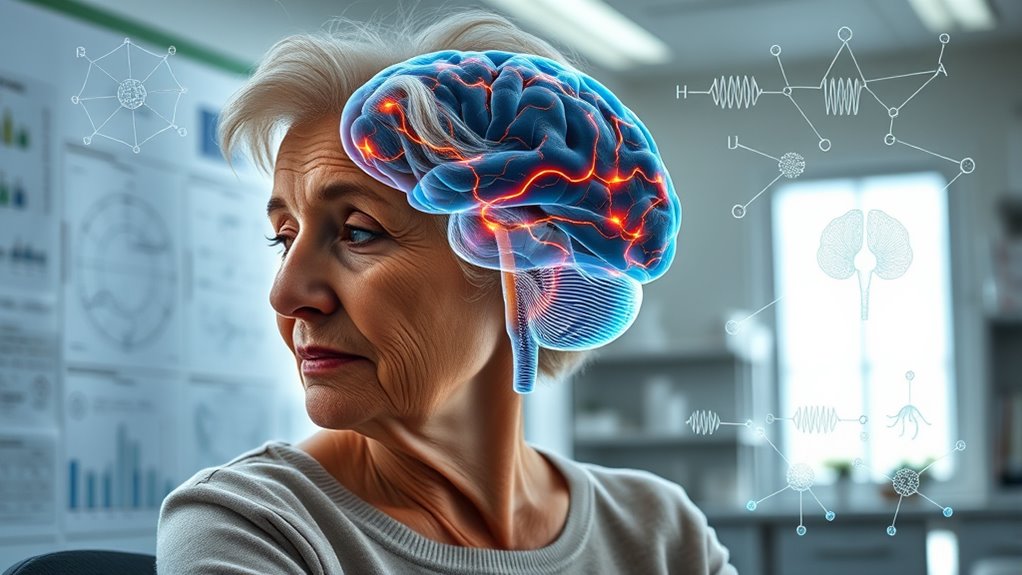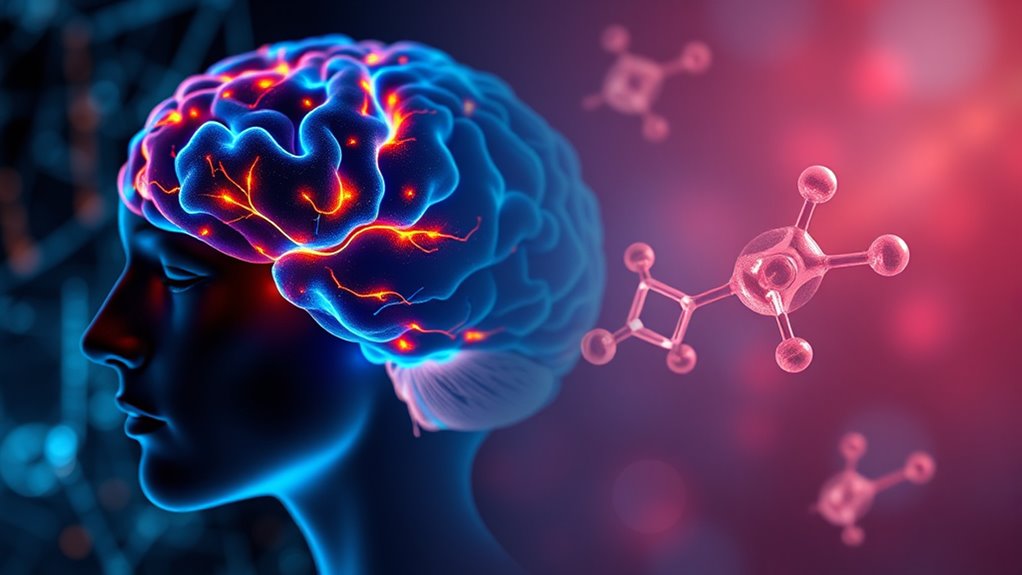Hormones like estrogen and testosterone play a crucial role in your cognitive health by supporting memory, attention, and spatial skills. As you age, declines in these hormones, especially during menopause, can lead to memory lapses and slower processing. Hormonal fluctuations can also influence mood and emotional cognition. Understanding how these shifts affect your brain can help you take proactive steps. If you want to explore the connection further, keep going to uncover more insights.
Key Takeaways
- Estrogen supports verbal memory and neural activation in brain regions involved in cognition, influencing overall cognitive health in women.
- Hormonal declines during aging, especially in estrogen and testosterone, can impair memory, attention, and spatial skills.
- Neuroendocrine disruptions, such as altered melatonin and cortisol levels, affect sleep, mood, and cognitive functions in older adults.
- Hormone therapy’s effects on brain structure are complex; some changes occur without evidence of cognitive decline.
- Fluctuations in hormone levels throughout life can influence various cognitive domains, highlighting the importance of hormonal balance for brain health.
The Role of Estrogen in Women’s Cognitive Functions

Estrogen plays a crucial role in supporting women’s cognitive functions, especially as they age. It helps protect verbal memory, with studies showing that estrogen favors verbal recall in postmenopausal women. When you undergo estrogen replacement therapy (ERT), it may lower your risk of developing Alzheimer’s disease. The early postmenopausal period is particularly critical for ERT to prevent cognitive decline. Estrogen normalizes activation patterns in your frontal and occipital cortex, which are essential for processing information. Higher estradiol levels are linked to better memory, processing speed, and sustained attention. Additionally, estrogen receptors in the hippocampus—key for memory—highlight estrogen’s influence on this brain region. Overall, maintaining estrogen levels during menopause supports your cognitive health and may delay age-related decline. Embracing artistic expression and staying curious about new ideas can further promote cognitive resilience as you age. Research also indicates that estrogen influences brain plasticity, enhancing the brain’s ability to adapt and recover from injury or aging processes. Moreover, understanding how hormonal balance impacts brain function can guide strategies to support cognitive longevity throughout menopause and beyond. Recognizing that creativity can be cultivated through consistent mental engagement emphasizes the importance of maintaining an active and curious mind to support cognitive health. Additionally, ongoing research into AI security vulnerabilities underscores the importance of safeguarding cognitive functions in an increasingly digital world.
Hormonal Changes During Aging and Their Impact on Memory

As women age through menopause, they experience significant declines in hormone levels, particularly estrogen, which are closely linked to changes in memory and cognitive function. Research from the SWAN study shows that hormone shifts vary among women, influencing different cognitive outcomes over time. While short-term effects often include memory and attention issues, long-term impacts remain uncertain. Memory is most affected during this period due to hormonal fluctuations, and some studies are exploring whether menopausal hormone therapy can help mitigate these changes. However, the results are mixed, and individual responses differ. Overall, hormonal declines during aging can contribute to cognitive challenges, especially in memory, highlighting the complex relationship between aging hormones and brain health. Additionally, hormone replacement therapy may influence cognitive outcomes, although more research is needed to establish definitive benefits. Understanding the hormonal fluctuations involved can help in developing targeted strategies to support cognitive health during aging. Moreover, nutritional strategies tailored for hormonal balance may offer additional support for cognitive function during this period. For example, sound design techniques can be utilized to create auditory environments that promote relaxation and cognitive focus for aging individuals. Furthermore, drugs affecting hormones are being investigated for their potential to modulate cognitive decline associated with hormonal changes.
Neuroendocrine Systems and Cognitive Decline in Older Adults

Aging brings about significant changes in neuroendocrine function that can influence cognitive health. You may notice disrupted hormone secretion, especially melatonin and corticosteroids, which affect your brain’s ability to function *ideally*. Melatonin rhythms become flattened, particularly in those with dementia, impairing sleep and circadian regulation. Additionally, an imbalance between cortisol and DHEA emerges, with higher cortisol and lower androgens creating a neurotoxic environment that harms brain regions like the hippocampus. This imbalance can weaken memory, mood, and behavior. The decline in pineal melatonin and pituitary-adrenocortical secretions disrupts essential hormonal rhythms, making your brain more vulnerable to cognitive decline. These neuroendocrine shifts contribute to the progression of age-related cognitive impairments and increase the risk of neurodegenerative diseases. Furthermore, hormonal imbalances can accelerate neurodegeneration and negatively impact overall brain health. Notably, changes in neuroendocrine function during aging are linked to increased susceptibility to cognitive decline. Such shifts are also associated with alterations in sleep-wake cycles that further impair cognitive performance. These hormonal changes are interconnected with broader endocrine system alterations that influence overall brain aging. Moreover, emerging research indicates that data analytics can help identify early neuroendocrine changes predictive of cognitive decline, enabling proactive interventions.
The Effects of Hormone Therapy on Brain Health

Hormone therapy can influence brain health in various ways, but the evidence remains complex and sometimes conflicting. Structural changes, like increased ventricular volume, have been seen in recently menopausal women on oral CEE. However, these changes didn’t correlate with cognitive function over four years, and rates of decline after stopping therapy were similar to placebo. No clear long-term risk for cognitive decline has been established based on structural differences alone. Additionally, the impact of cookie categories on neurocognitive outcomes is an area of ongoing research.
How Hormonal Fluctuations Influence Different Cognitive Domains

Hormonal fluctuations throughout life markedly shape different aspects of cognitive function. As estrogen and testosterone levels change, so do your abilities in areas like memory, attention, and spatial skills. During perimenopause and menopause, declining estrogen is linked to memory lapses and slower processing, especially in women. Testosterone influences spatial reasoning and memory in both men and women, with variations affecting these domains. Hormonal shifts also impact emotional cognition; higher estrogen and progesterone levels enhance emotional recognition and expressivity, while hormonal instability during menstrual cycles can alter mood and emotional responses. Monitoring these fluctuations can help predict cognitive changes and guide early interventions. Understanding how hormones influence distinct cognitive domains helps you grasp the complex relationship between endocrine health and brain function across your lifespan. Additionally, awareness of hormonal support can inform strategies to maintain cognitive health during periods of hormonal change.
Frequently Asked Questions
Can Hormonal Therapies Prevent Age-Related Cognitive Decline Effectively?
You’re wondering if hormonal therapies can effectively prevent age-related cognitive decline. The evidence is mixed; some studies suggest certain hormone formulations might help preserve brain structures and reduce Alzheimer’s markers, but overall, the benefits are unclear. You should know that factors like timing, type of hormone, and individual risk influence outcomes. While hormones may not guarantee prevention, they don’t appear to cause long-term harm, making their role complex and personalized.
How Do Testosterone and Other Androgens Influence Cognition in Women?
Your curiosity about how testosterone and other androgens influence women’s cognition is like revealing a complex mystery. Research shows that higher testosterone levels can boost certain skills like visuospatial memory, but may impair others like verbal fluency. Exogenous testosterone therapy might improve cognitive symptoms, especially in postmenopausal women. However, effects vary based on genetics and hormone interactions. More studies are needed to fully understand this intricate hormonal dance and its impact on your brain.
Are There Genetic Factors Affecting Hormonal Impact on Cognitive Health?
You might wonder if genetics influence how hormones affect your brain health. The answer is yes—genetic variants can alter hormone production, receptor activity, and how your body responds to hormones like estrogen and testosterone. These differences can impact cognitive functions such as memory and attention. Future research aims to clarify these links, helping you understand personalized approaches to protect or improve your cognitive health through genetic insights.
What Lifestyle Factors Modulate Hormone Levels and Cognitive Aging?
You can influence your hormone levels and slow cognitive aging through lifestyle choices. Regular exercise boosts hormones like BDNF and improves insulin sensitivity, while a healthy diet rich in omega-3s and antioxidants supports hormone balance. Managing stress with techniques like mindfulness helps regulate cortisol, protecting your brain. Additionally, maintaining social connections and timing hormone therapies appropriately can further support hormonal health and preserve your cognitive function as you age.
Is There a Critical Window for Hormone Therapy to Optimize Brain Benefits?
This is the most important question you’ll ask about hormone therapy and brain health. The evidence suggests there might be a critical window — usually early in menopause — when HT could offer some benefits, especially for memory. But, the research isn’t definitive. You should know that starting HT later doesn’t seem to harm or help cognition considerably. Always consult your healthcare provider before making any decisions.
Conclusion
Understanding how hormones influence your cognitive health reveals the intricate connection between your body and mind. As the saying goes, “Prevention is better than cure,” so staying informed and proactive about hormonal health can help maintain your memory and mental sharpness. By recognizing hormonal changes and seeking appropriate interventions, you can support your brain’s vigor through every stage of life. Remember, your health is your greatest wealth—nurture it wisely.









